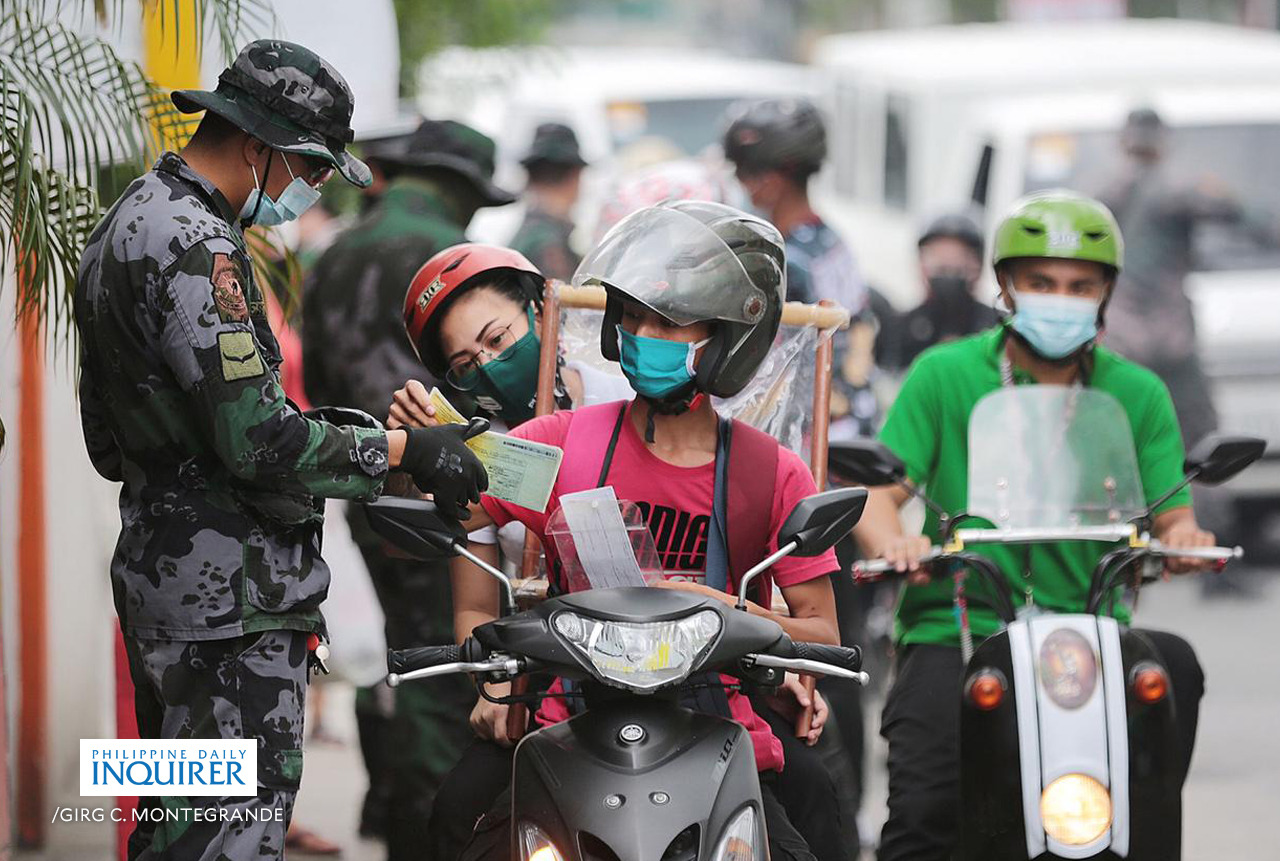Expired IATF cards, passes, are valid in areas under GCQ ‘bubble’ — Roque

(FILE) Police authorities set up a checkpoint at the border of Malabon and Navotas City on Thursday, July 16, 2020, as the entire city of Navotas enforces a two-week lockdown to arrest the growing number of coronavirus cases which claimed more than half a million deaths worldwide. INQUIRER/GRIG C. MONTEGRANDE
MANILA, Philippines — Expired travel passes issued by the Inter-Agency Task Force on Emerging Infectious Diseases (IATF) will still be recognized as Metro Manila and 4 nearby provinces enter a general community quarantine (GCQ) “bubble,” Presidential spokesperson Harry Roque said on Sunday.
According to Roque, the IATF passes given to frontliners and media practitioners in 2020 when Luzon and other areas were placed under an enhanced community quarantine (ECQ) that already expired are considered valid, especially with restrictions on non-essential travel.
Earlier, Roque announced that the IATF proposal to place Metro Manila, Bulacan, Cavite, Laguna, and Rizal under GCQ starting March 22 up to April 4 was approved by President Rodrigo Duterte.
READ: NCR, Bulacan, Cavite, Laguna, Rizal under GCQ until April 4 — IATF
“Pwede po ‘yan, lahat po ng IATF IDs maski nakasulat doon na paso na, nagkaroon po ng resolution that they would be valid until matapos po itong state of public health emergency,” he said in his briefing.
Article continues after this advertisementRoque also clarified that as the country tries to create a bubble — to prevent the high rate of COVID-19 transmissions in Metro Manila from reaching other provinces — only movement within the five areas will be allowed.
Article continues after this advertisementThat means that people in the National Capital Region (NCR), Bulacan, Cavite, Laguna, and Rizal can travel freely only within their respective “bubbles.” However, non-essential travel outside the “bubbles,” or movement that is not related to work or other essential purposes, will not be allowed.
“Ang bubble natin, Metro Manila, Laguna, Bulacan, Cavite, at Rizal. So pu-pwede kayo bumiyahe freely between Metro Manila and these provinces. Pero hindi pu-pwedeng lumabas, hindi pwedeng pumasok,” Roque explained.
“Hindi po kayo pu-pwedeng sumakay ng eroplano kung hindi po kayo ba-byahe ng essential travel. Kung hindi niyo po mapapakita na kayo’y magta-trabaho sa lugar na pupuntahan ninyo, o kayo ay health worker na nagtatrabaho ‘don sa lugar na ‘yon, hindi rin po kayo mapapayagan […] At ang turismo po, uulitin ko po, is a non-essential activity,” he added.
Bubbles have been created in other countries for the purpose of limiting non-COVID-19 positive people in a certain area, for a period of time. Some of the notable bubbles include that of the National Basketball Association (NBA), which resumed basketball games in a bubble near Orlando.
A similar bubble was adopted by the Philippine Basketball Association (PBA) last October for its previous season, as the league is affected by financial problems with having no games since March 2020.
READ: After successful bubble, NBA grapples with uncertain future
READ: Ginebra, other teams enter PBA bubble
Roque noted that there will be checkpoints again, but it may be extended farther to the borders shared by the provinces under GCQ with those not included in the bubble.
“Ipatutupad po natin ‘yan sa pamamagitan ng checkpoints. Ang checkpoints po ngayon — dati-dati kasi, dito lang sa Valenzuela. Ngayon, ‘don na sa Bulacan, sa boundary ng Metro Manila at Bulacan, sa boundary na siguro po ng Rizal at ng mga karatig na probinsya, at sa boundary ng Cavite at ng Batangas,” Roque said.
“So magkakaroon po ‘yan ng checkpoints at siguro bukas po si General (Guillermo) Eleazar will announce kung nasa-saan po ang mga checkpoints na ito,” he added.
The country is currently experiencing a surge of COVID-19 cases, attributed by health experts to more infectious new variants of concern — the main reason why the IATF proposed the imposition of a GCQ in areas under the “bubble.”
As of Sunday, the country has 73,072 active COVID-19 cases after the Department of Health (DOH) recorded 7,757 new cases — the third consecutive day that the country registered over 7,000 new COVID-19 cases, as it previously recorded 7,103 and 7,999 on Friday and Saturday, respectively.
READ: PH new COVID-19 cases at 7,757; active cases now at 73,072
/MUF
For more news about the novel coronavirus click here.
What you need to know about Coronavirus.
For more information on COVID-19, call the DOH Hotline: (02) 86517800 local 1149/1150.
The Inquirer Foundation supports our healthcare frontliners and is still accepting cash donations to be deposited at Banco de Oro (BDO) current account #007960018860 or donate through PayMaya using this link.